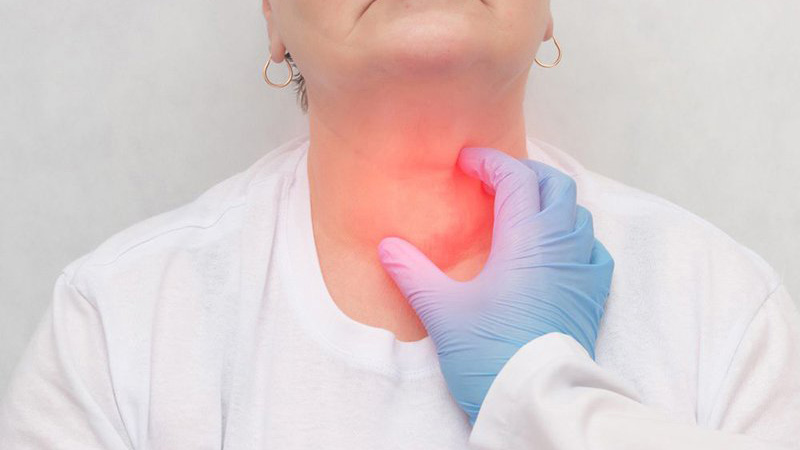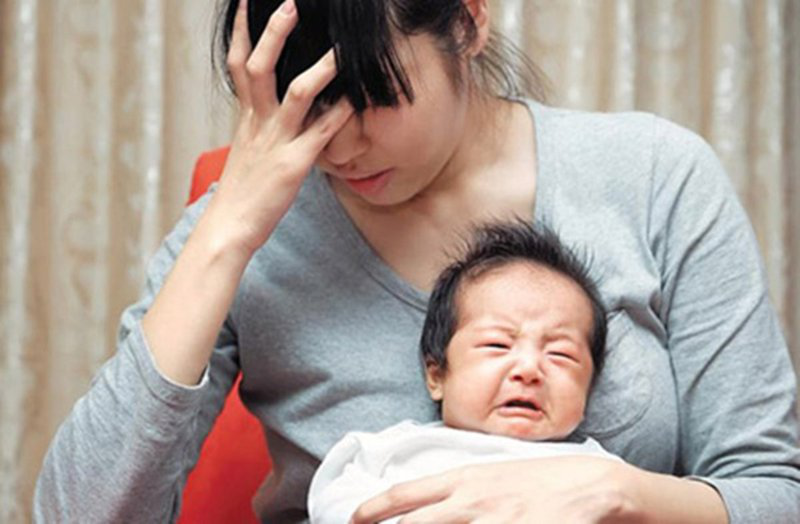Postpartum thyroiditis occurs in the early stages after giving birth when the thyroid gland has no signs of disease. The disease is not uncommon in women after giving birth, most thyroid function will return to normal after about a year, but there are still cases of complications that require a long time to treat.
What is postpartum thyroiditis?
Postpartum thyroiditis has initial symptoms that are difficult to detect and are easily overlooked because the thyroid gland does not show any abnormal signs during pregnancy. Thyroiditis only occurs in the first year after giving birth.

Postpartum thyroiditis has no abnormal signs during pregnancy.
The thyroid gland is an organ located in the front of the neck that plays an important role in regulating the body’s energy use through the production of thyroid hormones. Thyroid hormones travel through the bloodstream to all parts of the body and affect almost every organ in the body. Therefore, any imbalance in thyroid hormones will affect overall health.
Postpartum thyroiditis can affect women for several weeks or even months. The problem lies in recognizing this condition, because the symptoms of postpartum thyroiditis are often easily confused with the stress associated with postpartum mood disorders. Therefore, the detection and effective treatment of the disease are also affected.
In most cases of postpartum thyroiditis, thyroid function will return to normal after about 12 – 18 months from the onset of symptoms of inflammation. However, some women may face the risk of permanent complications.
Causes of Postpartum Thyroiditis
The exact cause of postpartum thyroiditis is still unclear and uncertain. However, research shows that women with postpartum thyroiditis often have high levels of anti-thyroid antibodies during early pregnancy and after giving birth.

Postpartum thyroiditis of unknown cause
This suggests that women with postpartum thyroiditis may have an underlying autoimmune thyroid condition that flares up due to altered immune function. This underlying condition has many similarities to Hashimoto’s thyroiditis, where the immune system attacks the thyroid gland.
A closer look at the risk factors associated with postpartum thyroiditis reveals a complex interplay of factors, including:
- Autoimmune disorders, such as type 1 diabetes;
- A history of postpartum thyroiditis;
- High levels of antithyroid antibodies;
- A history of previous thyroid problems;
- A family history of thyroid problems.
Scientists continue to investigate the root causes and risk factors associated with postpartum thyroiditis. In addition to the immediate effects, studies have revealed a notable correlation between postpartum thyroiditis and postpartum depression. This symbiotic relationship highlights the importance of vigilance and proactive health care. If you have postpartum depression, see your doctor to have your thyroid function checked, detect thyroid abnormalities early, and get appropriate treatment.
Postpartum thyroiditis symptoms
Women with postpartum thyroiditis may experience two stages:
In the early stages, inflammation and thyroid hormone release may mimic signs of an overactive thyroid (hyperthyroidism). The body reacts with symptoms such as anxiety, irritability, rapid heart rate or dizziness, palpitations, unexplained weight loss, increased sensitivity to heat, fatigue, tremors, and insomnia. These symptoms usually appear 1 to 4 months after giving birth and last 1 to 3 months.

Rapid weight loss is also a sign of postpartum thyroiditis.
In the next stage, some patients will recover completely, while in others, the thyroid gland is destroyed. The damaged thyroid gland will function less effectively, gradually leading to hypothyroidism. This stage can cause mild but significant symptoms including lack of energy, increased sensitivity to cold, constipation, dry skin, weight gain and feelings of depression. These hypothyroid symptoms appear 4 to 6 months after the hyperthyroid symptoms resolve, lasting up to 12 months.
In general, postpartum thyroiditis will progress differently between mothers. For some, the condition may disappear completely, when thyroid function returns to normal. On the contrary, others may have more serious thyroid problems, requiring hormone replacement therapy to control the consequences of thyroid destruction.
It is noteworthy that some women may experience combined symptoms of both hyperthyroidism and hypothyroidism, making treatment even more difficult. Therefore, specialists recommend that women after giving birth need to monitor and promptly recognize the symptoms of postpartum thyroiditis, early examination and timely treatment will bring high efficiency.
Preventing postpartum thyroiditis
Postpartum thyroiditis is a disease that often cannot be prevented in advance, but women after giving birth should proactively take some self-care measures to prevent thyroid inflammation:
- Eat a reasonable, healthy diet through choosing safe foods, ensuring adequate nutrition and proper processing.
- Exercise regularly to improve health.
- Build a healthy, scientific lifestyle, specifically sleeping on time, getting enough sleep and resting properly.

Mothers should choose safe foods with full nutrients to ensure health after giving birth.
Because the symptoms of postpartum thyroiditis are often unclear, they are easily confused with the stress of caring for a newborn. Hopefully, after reading this article, women will not be subjective with postpartum thyroiditis but pay more attention to the manifestations of the body. It is best to see a doctor as soon as there are unusual symptoms for timely examination and consultation. Postpartum thyroiditis can be completely controlled and effectively treated if detected early and treated appropriately.





